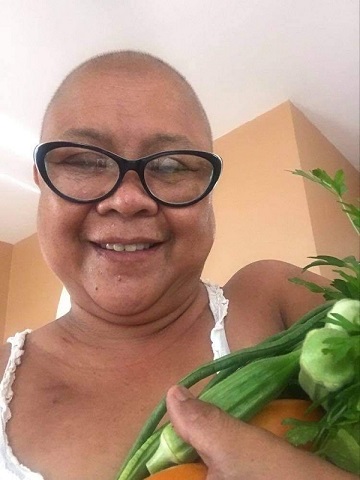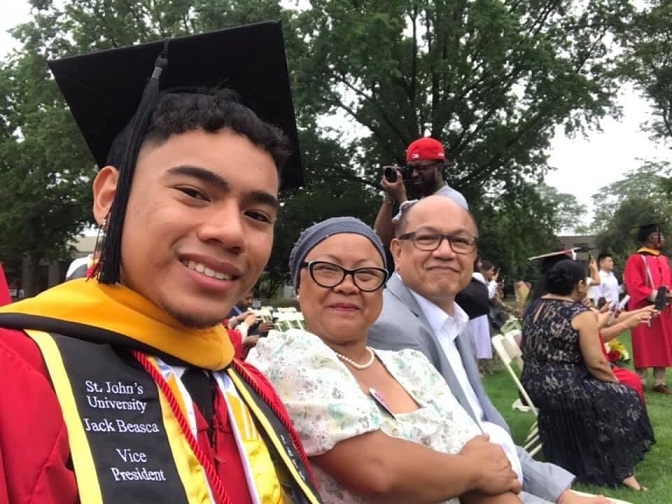Liza Ty Beasca: A wrong call on cancer and a NYC teacher’s road to recovery

By Vicky Potenciano-Vitug
Liza Ty Beasca was a Special Education Teacher in a Harlem public school. A devoted mentor, she made her classroom a joyful learning place for young children diagnosed with severe disabilities such as autism and Down Syndrome.
Her love of teaching came to a disheartening end in 2011 when she was diagnosed with Stage 1B cancer on her left breast. This was a type that fed on the hormone estrogen and has spread to the lymph nodes. She promptly submitted to lumpectomy to remove the cancerous tissue, followed by chemotherapy to a series of radiation treatments.
Liza‘s eagerness to report back to school made her recovery encouraging. For eight and a half years after treatment, she was taking Tamoxifen, a hormone inhibitor followed by Letrozole to help prevent the cancer from recurring. Liza was optimistic and looked forward to the 10 years needed for her to be considered “cancer free.” She continued to live the life she knew best, always making time for her passions, such as cooking for her family, visiting her children and grandchildren in the Philippines, gardening, singing, swimming, and traveling.
In June of 2019, however, she began to experience excruciating pain, a stiff neck that, combined with fatigue, limited her movement. She went to consult an orthopedic surgeon who recommended physical therapy. Sessions with her PT bore little relief. Liza decided to get MRI in September. The MRI showed “white spots consistent with metastasis,” she said. She was shocked that her cancer had come back and spread to her bones. Her oncologist immediately began a non-chemo treatment for the same characteristics in 2011.
A second opinion from Memorial Sloan Kettering Cancer Center (MSKCC) revealed a more troubling finding: The cancer has changed to a rare kind and the treatment she had been given did not match her condition. She was diagnosed with stage 4 metastatic Triple-Negative Breast Cancer (TNBC) and chemotherapy was the only line of treatment option for her.

In short, she said, “My illness was misdiagnosed.”
TNBC, according to CDC.org, is “a kind of breast cancer that does not have any of the receptors that are commonly found in breast cancer.” Cancer cells are likened to a house and the receptors are the “locks” to keep out the cancer cells. TNBC happens when the three receptors of estrogen, progesterone, and HER2 are not present. Liza’s cancer mutated from hormone + to triple negative.

Unfortunately, there was no drug available for TNBC at that time. Liza went through two lines of chemo treatment nonetheless – using Taxol by infusion) and Capecitabine (oral chemo pills) – but both failed to stop the spread of the cancer.
She recalled the difficult moments during chemo. She was in and out of the emergency room due to falls and head injuries. Neck pain was 24/7 and nausea was constant. She experienced heightened sense of emotions which made her highly irritable. She lost a dozen pounds.
As soon as friends found out her cancer was more aggressive this time, all sorts of support poured in: cooked food, flowers, books, and prayers. Some came to visit and offered to drive her to the hospital to help her son Jack with the chores.
Running out of options, Liza felt she had to prepare for the inevitable. Metastatic TNBC had a poor prognosis of 13.3 months. She and her oncologist began to look for clinical trials.
The good news came in April 2020 when a promising drug, Trodelvy, got an accelerated approval from the FDA. Liza was one of the first to take it. Three months later, her condition improved. Six months more and her scans showed “no cancer activity was detected.” By May 2021, her cancer was declared in remission.
In July, her oncologist allowed her to take her first chemo break. Liza devoted the time to celebrate with her family. Her youngest son Jack graduated cum laude from St. John’s University and is now a certified Physician Assistant. Her second son Lean and daughter-in-law Monica are expecting their first child. Her husband Joel, who works for the United Nations and is stationed in South Sudan, has been around for the family’s memorable milestones. She was able to celebrate with her mother who turned 80.
“There are so many things to be happy about,” mused Liza as she shared her story with this writer. “I do not wait for good days because I can make any day good.”
She is thinking about her options, legal or otherwise. She said a discussion with family and knowledgeable people “can help me decide.”
“I face life with whatever God has blessed me with and work to be better every day,” she continued. “I have never called my illness a fight. I face it as it comes to me. I am my biggest advocate.”


© The FilAm 2021










